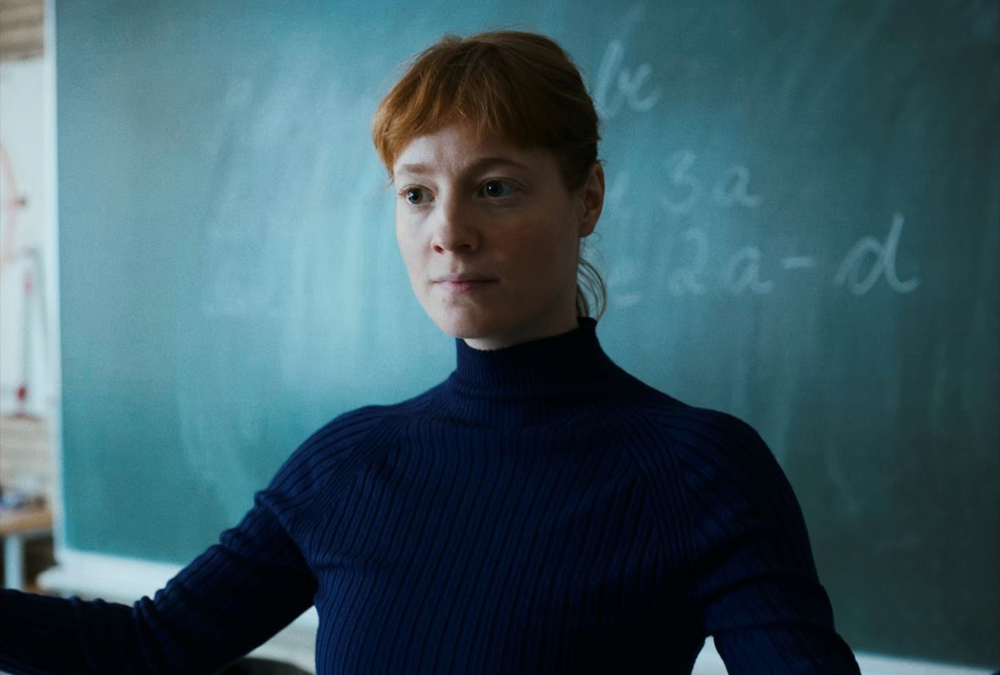“When you make a cheat sheet, at least get stuff right,” Carla Nowak (Leonie Benesch) wryly advises one of her pupils in “The Teachers’ Lounge,” upon catching him cheating on a test far less angry that he’s lying to her now by insisting he didn’t than what advantage he gave himself that his fellow seventh graders didn’t have. For Ms. Nowak, the issue of fairness supersedes all others, making her cool among her classes for letting less important things slide and unusually patient in resolving situations, believing all sides deserve a fair hearing. This all seems quite admirable until she’s the one caught up in a moral conundrum in İlker Çatak’s darkly comic drama which sees the teacher learning along the way some of the lessons that she’s tried to impart to her students.
Despite the airy modern trappings of the school where Ms. Nowak works, the attitudes can seem decidedly archaic when its headmistress Dr. Bohm (Anne-Kathrin Gummich) can walk into her classroom at will and demand to see students’ wallets when a small amount of money has gone missing. That a son of Turkish immigrants in the predominantly white school is accused with specious evidence and almost immediately vindicated after a talk with his parents doesn’t sit well with Ms. Nowak at all, yet it doesn’t prevent her from making an accusation of her own when she hatches a novel way to identify the thief, leaving her laptop open in the teacher’s lounge to catch them in the act. She may achieve some peace of mind when the gambit works, getting relatively strong evidence that a member of the faculty (Eva Löbau) has been dipping into people’s pockets, but it becomes a ever-growing headache when she tries to have the matter resolved by the school’s administration.
Ms. Nowak’s hope that the money could just be returned after bringing it to Dr. Bohm’s attention seems a bit naive, with the principal duty-bound to take any concerns to the school’s lawyers and there’s the additional complication that the faculty member’s son Oskar (Leonard Stettnisch) is currently a student in her class. Even though she teaches math, none of this adds up for Ms. Nowak, who rapidly sees her best qualities work against her when she is constantly defending the actions of those who are most upset with her out of a sense of fairness and all others at the school would rather stick up for themselves rather than reach some sort of compromise that would in a way come across as weakness.
The larger political implications of what unfolds are wisely saved for the conversations that will happen after “The Teachers’ Lounge” is over, but Çatak and co-writer Johannes Duncker shrewdly create a scenario where idealism in any number of forms prevents the characters from being able to practically deal with the reality in front of them, a situation amplified by cinematographer Judith Kaufmann deftly navigating the school as if it were a labyrinth in following Ms. Nowak around. The unassuming Benesch proves to be a force to be reckoned with as the educator is gradually drained of her core beliefs, able to express disillusionment without betraying the brave face she puts on to walk back into a place that’s disappointed her so deeply and composer Marvin Miller can be counted on to pluck strings as if touching a nerve. “The Teachers’ Lounge” is bound to hit on more than a few, but in succeeding as a provocation, it never fails to entertain.
“The Teachers’ Lounge” will screen at Berlinale on February 19th at 1:30 pm at the Haus der Berliner Festspiele, February 20th at 10 am at Cubix 7, February 21st at 8:30 pm at Blauser Stern, and February 25th at 6:30 pm at the Cineplex Titania.




